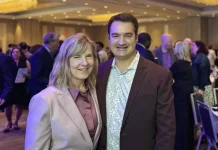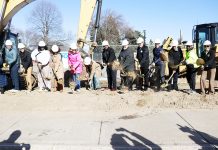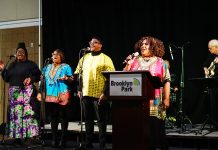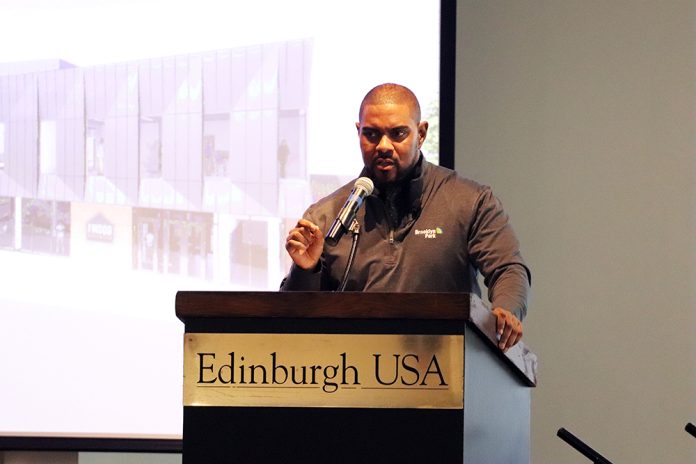
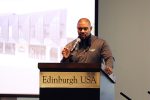
Brooklyn Park Mayor Hollies Winston presented the annual State of the City Address on Tuesday evening, his third since taking office on Jan. 9, 2023.
He preceded his speech by thanking first responders from the cities of Plymouth, Fridley and Osseo for assisting the Brooklyn Park fire department when U.S. Bank executive Terry Dolan’s single-engine Socata TBM7 plane crashed into a Brooklyn Park home on March 29. Dolan, who died in the crash, was the only occupant of the plane. The home was a total loss but the only occupant at the time was able to escape.
In a 30-minute speech delivered at the city-owned Edinburgh USA, and livestreamed on Facebook, Winston reflected on the mostly positive developments of the past year and laid out a vision that demonstrated “it’s not all doom and gloom.”
“I’m going to speak very plainly, as I normally do. Last year, I told you a long unacknowledged truth, Brooklyn Park has been underfunded and under recognized for far too long.” Winston said.
He pointed to Local Government Aid (LGA), where he said the city has not received the level of aid from the state it deserves compared to peer cities like Bloomington. This, he claimed, has resulted in a higher tax burden for city tax payers, especially homeowners.
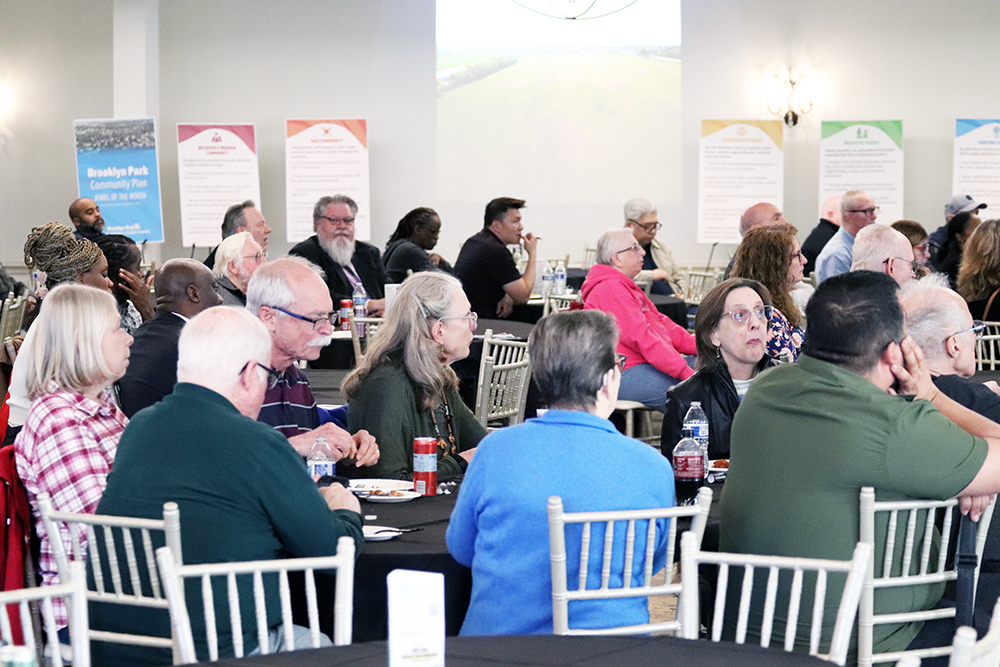
In existence since 1972, the level of LGA that a city receives is largely driven by its property tax base using what the League of Minnesota Cities describes as a “complex formula.” A city with a large property tax base will receive less compared with cities that do not. The Minnesota Department of Revenue is the body tasked by law the role of certifying the amount of aid a city receives. The department on its website says what is allocated to each city is “based on current LGA statutes, including any changes enacted during the most recent legislative session.”
The revenue department in its most recent report has the total amount of LGA certified for all cities in 2025 at $644,398,012, of which Brooklyn Park will receive $917,834 while Bloomington, Champlin and Maple Grove will receive $0. Neighboring Brooklyn Center which does not have a big property tax base as Brooklyn Park will receive $3,034,626.
“We’ve made great progress, both on the ground, but also with adjusting the state’s perception of us and our role in larger state conversations,” Winston said. “While we may still face gaps in economic development compared to peer cities like Bloomington, people are starting to listen. The legislature is listening. Our regional partners are listening.”
To drive home his point, Winston pointed to the success of the upcoming BioTech Innovation District, which he said was successful because city leadership and state-level elected officials “are increasingly speaking with one very effective and powerful voice.” The district is expected to break ground in 2026 and create an estimated 10,000 jobs. The city was given the authority last year by the Minnesota Legislature to issue bonds.
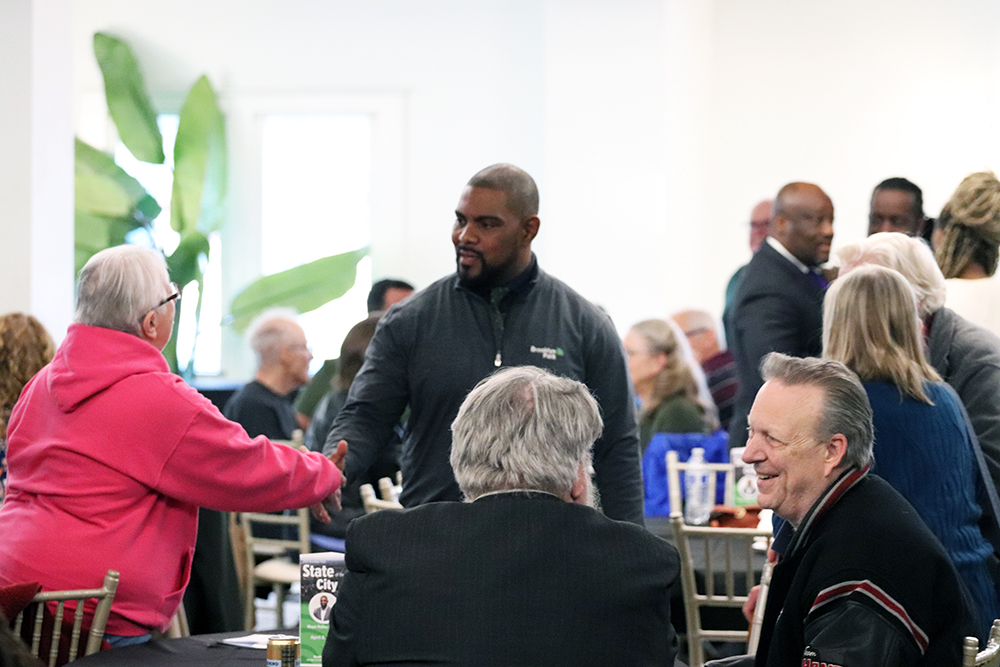
Winston drew parallels between Destination Medical Center (DMC) in Rochester and his city’s Biotech Innovation District, which he said would place it on the global map.
“That’s why they (Rochester) get to be first in class not just in this country, but in the entire world, Brooklyn Park has a similar recognition now at the state level for biotech, ” Winston said. “We’re going to be known as the city that houses biotech and that is first in class in biotech. That’s important. That vision is also becoming a reality.”
Public safety was a major talking point for Winston during his speech.
“We’ve also expanded our alternate response team, which diverted hundreds of mental health calls from traditional emergency services, lightening the load on our (police) officers and making sure residents got the care and get the care they needed, ” Winston said. “In fact, mental health-related 911 calls dropped by 15%, which allows our police to focus on more upstream or sometimes more dangerous situations.”
Additionally, Winston mentioned the success of the city’s police crime analysts that were able to link a recent shooting suspect to other crimes in the metro.
Wins by the police department was not the only issue Winston spoke on regarding public safety. What was possibly the most unpredictable part of his speech was when he addressed the proliferation of group homes in the city.
” We’re leading efforts to change state policy around congregate care facilities, these homes, often called group homes, are a critical part of Minnesota’s care model. They’re necessary, and we very much support them as a city. But in Brooklyn Park, their density has become a public safety concern” Winston said. “While they percentage-wise constitute 1.7% of our homes, nearly one in ten police and fire calls originate from these facilities, costing us $3 million to $4 million annually. But additionally, we have more of these facilities than Minneapolis.”
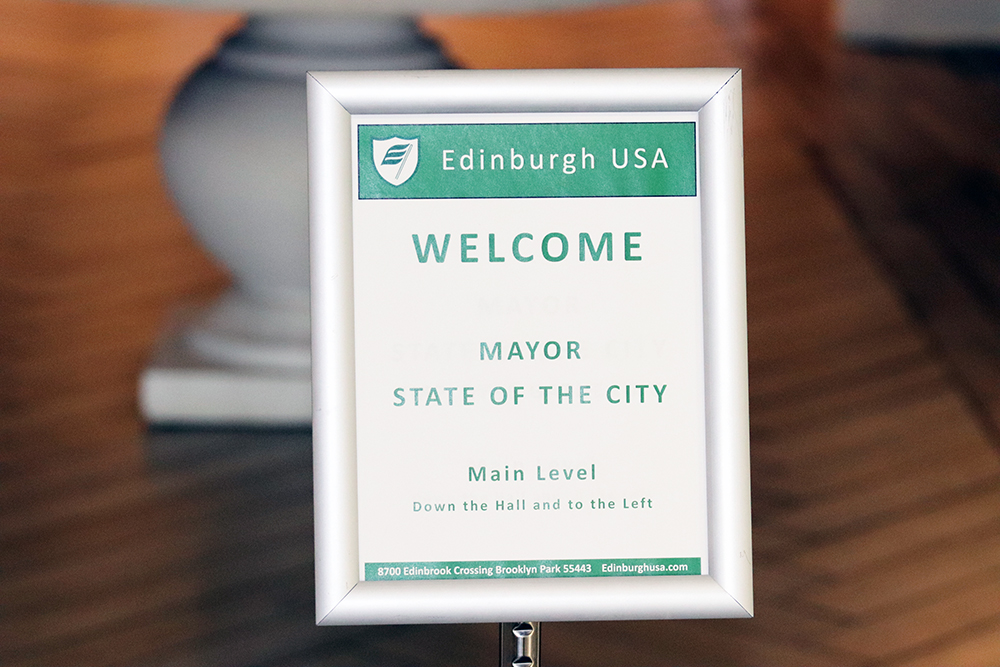
Winston said the city is working with Sen. John Hoffman (DFL-Champlin), who chairs the Senate Human Services Committee at the Legislature, to change the law to give cities his size some oversight at what happens at group homes, the same way First Class cities like Minneapolis can to address the density issue. First Class cities are those with a population of over 100,000 as defined by statue.
The groundbreaking of the city’s new teen center, which happened the day before his address, was also a major talking point for Winston in his speech.
“For all the investment we’ve made in traditional policing, we’re also focused on continuing to invest in prevention activities that we know reduce crime. So, on a lighter note, that’s why we broke ground yesterday on a brand-new teen center,” Winston said. “It will feature a gym, arts and music space, a workforce development office, and a Best Buy teen tech center. And here’s why this is important. And I wish I could take credit for that again, but that’s actually Marcus Hill and Director Brad Tolberg have been fighting for this for quite some time.”
About Tom Gitaa Gitaa, Editor-in-Chief
Born and raised in Kenya's coastal city of Mombasa, Tom is the Founder, Editor-in-Chief and Publisher of Mshale which has been reporting on the news and culture of African immigrants in the United States since 1995. He has a BA in Business from Metro State University and a Public Leadership Credential from Harvard’s Kennedy School of Government. He was the original host of Talking Drum, the signature current affairs show on the African Broadcasting Network (ABN-America), which was available nationwide in the United States via the Dish Network satellite service. On the show, he interviewed Nobel laureates such as 2004 Nobel Peace prize winner, Professor Wangari Maathai, the first woman from Africa to win the peace prize and heads of states. Tom has served and chaired various boards including Global Minnesota (formerly Minnesota International Center), the sixth largest World Affairs Council in the United States. He has previously served as the first Black President of the Board of Directors at Books for Africa. He also serves on the boards of New Vision Foundation and the Minnesota Multicultural Media Consortium. He has previously served two terms on the board of the United Nations Association. An avid runner, he retired from running full marathons after turning 50 and now only focuses on training for half marathons.
- Web |
- More Posts(455)


